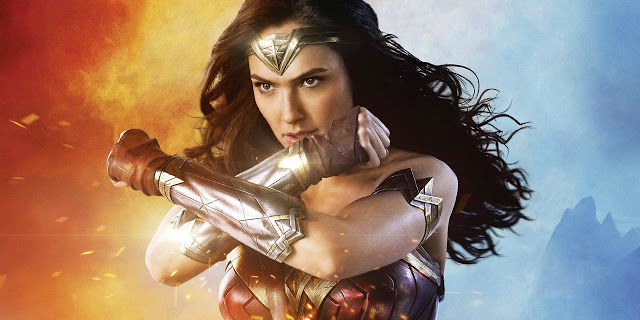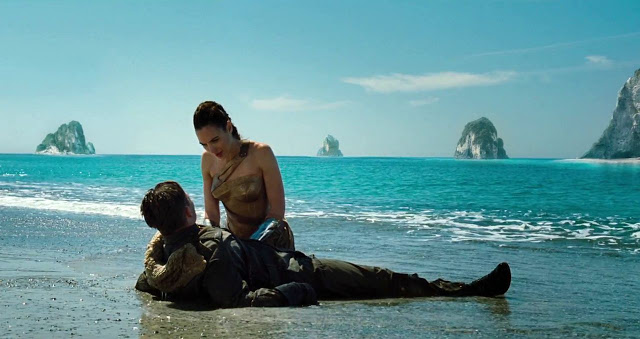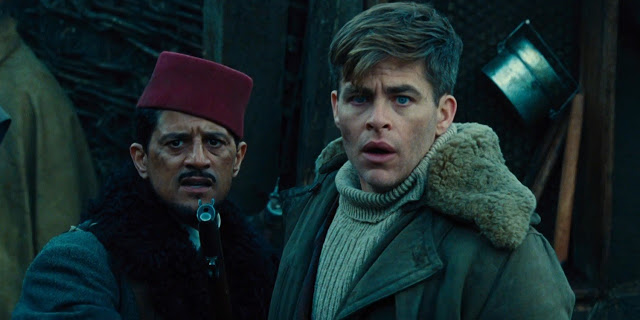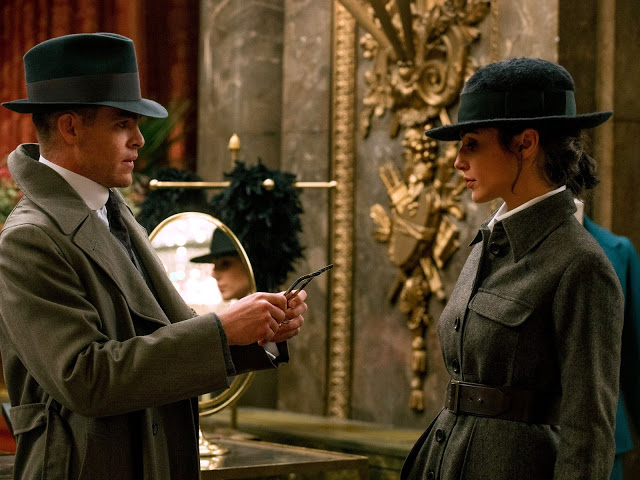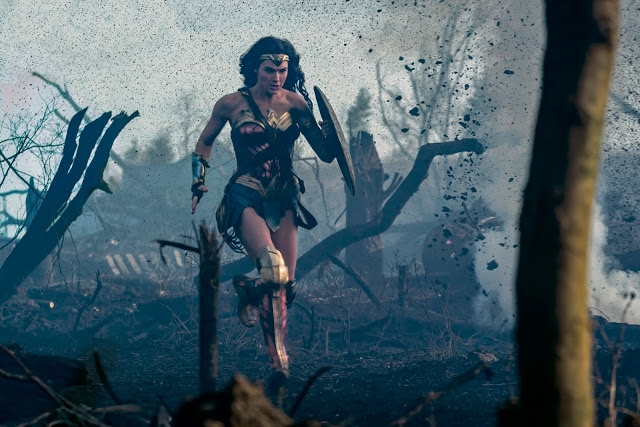As she rushes headlong across a barren wasteland toward entrenched enemy troops, the Amazon gathers speed and momentum, hair streaming behind her as she deflects oncoming bullets with a flick of her gauntleted wrists. It’s a sequence of breathless verve and grandeur, but it earns an extra meta kick thanks to its setting. The year is 1918, and the location is the western front in Belgium. This means, as students of military history surely know, that the Amazon is charging through not just any field but a particularly named stretch of mud: no man’s land. The metaphor is almost too perfect. Superheroes have done all sorts of impressive things in modern movies, but to my knowledge, this is the first time that a costumed warrior has obliterated both German soldiers and the Hollywood patriarchy in one gorgeously filmed swoop.
Perhaps I’m exaggerating. After all, the broader statistical data about women both behind and in front of the camera remain dispiriting, and just as Wonder Woman the heroine cannot win World War I on her own, Wonder Woman the movie—the first high-profile superhero film to feature a female director and star—cannot by itself cure an industry that continues to be plagued by sexism. But it’s a start. Still, advancements in representation aside, the question remains whether this movie, directed by Patty Jenkins, qualifies as a victory of artistry as well as diversity. Thankfully, Jenkins has made a spry and enjoyable adventure, if one accompanied by many of the flaws endemic to the genre. It’s far from great, but it’s mostly good enough.
As all origin stories must, Wonder Woman opens with an extended prologue set in its protagonist’s childhood, as the warrior princess Diana comes of age on the fictional island of Themyscira, home of the Amazons. In the comics, it’s often dubbed Paradise Island, and you can see why; shooting off the coast of Italy, Jenkins and her production designer, Aline Bonetto (best known for her whimsical collaborations with Jean-Pierre Jeunet), have created a seaside utopia that seems like a cross between the Hanging Gardens of Babylon and the Bahamas. It’s a place of dazzling brightness—vast sky, golden beaches, crystal-blue water—which makes it a pleasing counterpoint to the grey, smoggy environments typically found in the DCEU.
That acronym, for the uninitiated, stands for “DC Extended Universe”, Warner Bros.’ desperate attempt turn the heroes of DC Comics into a unified fighting force to rival the might of the Marvel Cinematic Universe and those pesky Avengers. It’s been a rocky effort thus far—the conglomerate’s previous entries include Man of Steel, Batman v Superman: Dawn of Justice, and Suicide Squad—so when I declare that Wonder Woman is the DCEU’s best movie yet, I’m not saying much of substance. And certainly, problems remain, particularly with pacing and plotting. That prologue, for example—in which a preteen Diana is sheltered by her protective mother (Connie Nielsen) but secretly trains under the eye of her stern aunt (Robin Wright)—is both familiar and overlong, burdened with excess mythology yet lacking in compelling material. The film needs a jolt, and it gets one when, like a lightning bolt from Zeus, there suddenly falls from the sky none other than Captain America.
Whoops, sorry, I got my superhero Steves confused. Or maybe it was my actorly Chrises. In any event, the pilot whose wrecked plane abruptly disturbs the gentle waters of Themyscira is not Steve Rogers but Steve Trevor, and he is played not by Chris Evans but by Chris Pine, that turquoise-eyed voyager on apparent loan from the Starship Enterprise. Rescued from drowning by a now-grown Diana (Gal Gadot, reprising her glorified cameo from Batman v Superman), Steve’s arrival catalyzes Wonder Woman, both introducing its main storyline and, more importantly, putting its two principal characters side by strapping side. When Steve tells the Amazons about “the war to end all wars”, Diana is convinced that the Kaiser’s troops are unknowingly acting at the behest of Ares, the vengeful battle god who relishes corrupting the hearts of men. She thus resolves to accompany Steve to the front, where she intends to locate and slay Ares, thereby ending the worldwide conflict with one swing of her immortally forged sword.
In bold strokes, Wonder Woman’s closest cinematic ancestor isn’t any one of the prior DCEU films but Marvel’s Captain America: The First Avenger, another comic-book adaptation that used a historical global conflagration as scaffolding for a superhero origin tale. Here, though rumors of an armistice beckon, Diana and Steve learn of the grotesque experiments of General Ludendorff (Danny Huston, even hammier than usual), a German firebrand hoping to derail the peace talks with a mask-resistant mustard gas created by his disfigured assistant, Isabel Maru, aka (awesomely known as) Doctor Poison (Elena Anaya). With the blessing of a British commander (David Thewlis, always welcome), our resilient heroes assemble a ragtag group of guerrilla fighters—including a spy (Saïd Taghmaoui, ibid), a sniper (Trainspotting’s Ewen Bremner), and a tracker (Eugene Brave Rock)—and race to Belgium to stop Ludendorff before he can transform Europe into his personal laboratory and morgue.
It’s a rather ungainly setup, and when judged against traditional metrics, Wonder Woman is pleasant but unexceptional. As an action director, Jenkins wisely avoids the lumbering, wall-smashing, testosterone-fueled bludgeoning that is Zack Snyder’s calling card, but with the exception of that triumphant charge across no man’s land, her set pieces aren’t especially memorable. To be fair, she does compose the occasional eye-opening shot, such as a moment when Diana uses her comrades as a makeshift trampoline and springs across a courtyard. But she also dutifully obeys the unbending rule that every superhero climax must involve incessant sound and fury, a decision that proves especially toxic here when the combatants are two godlike beings hurling CGI fire and lightning at one another. More damningly, the movie’s villains—including the snarling Ludendorff and a thinly disguised big bad—are dull, while the supporting players in Diana and Steve’s ad-hoc platoon never acquire real definition. Rupert Gregson-Williams’ score dubiously retains Diana’s heavy-metal guitar theme from Batman v Superman, and while the 3-D does some cool stuff with the Amazons’ arrows, it isn’t employed skillfully or regularly enough to justify the dimming effect, much less the surcharge at the box office.
Yet even if Wonder Woman never quite clicks as a pure genre exercise, it thrives when dabbling in a number of other genres not normally associated with the superhero canon. It is, in no particular order, a genuinely winning romance, a delightful fish-out-of-water comedy and a surprisingly poignant war film.
Let’s begin with the comedy, because Wonder Woman has as much in common with Splash as it does Superman. Jenkins, whose only previous feature is the Charlize Theron vehicle Monster (not exactly known for its laughs), exhibits a refreshing lightness of touch, and the scenes where Steve shepherds Diana around London—modernizing her wardrobe, masquerading her as his secretary, introducing her to the glories of ice cream—sparkle with warmth and humor.
Much of this success is thanks to the abundant charms of the actors, which brings us to the romance. Gadot and Pine make a pretty pair—she with her supple curves and infinitely long legs, he with his square jaw and sapphire-blue eyes—but their appeal here extends well beyond physical attractiveness. It is instead a matter of that indefinable quality we call chemistry. Diana and Steve’s relationship—traversing an arc that progresses from adorable awkwardness to flirty banter to actual heat—is a fully fledged love story, and Gadot and Pine together highlight the characters’ mutual admiration and curiosity. An early scene where Steve delicately prods Diana on her knowledge of sex, only for her to matter-of-factly remark on “the pleasures of the flesh”, is comedy gold, but it also establishes the connection between them that continually deepens over the course of the film.
And despite its perfunctory pyrotechnics and lackluster third act (which is partially redeemed by a canny editing loop), Wonder Woman demonstrates an emotional sophistication uncommon in franchise fare. Some of this is a consequence of its self-contained nature; with the exception of its pointless opening and closing scenes, the film wastes no effort connecting to the larger DCEU, which instead affords Jenkins time to develop true three-dimensional characters. But it’s also evident in the movie’s thoughtful depiction of war, both the anguish it begets and the bravery it inspires. When Diana insists to Steve that they need to oppose Ludendorff’s lunacy with force, she’s fulfilling her duty as an immortal, but she’s also issuing a call to arms, encouraging those who cherish freedom to fight for it. No wonder he falls for her.
Shortly after meeting Steve—the first man she’s ever encountered—Diana asks if he’s representative of the male species. His modest reply? “I am… above average.” It’s hard to argue with him. And while Wonder Woman is in many respects an average movie, its atypical virtues—tender romance, emotional intelligence, a strong female lead—help it stand out within a saturated superhero (meat) market. Unlike Diana herself, it isn’t quite a gift from the gods. But in that transcendent moment when its heroine sheds her camouflage, dons her circlet, and charges into battle, damn if I didn’t get religion.
Jeremy Beck is the editor-in-chief of MovieManifesto. He watches more movies and television than he probably should.

